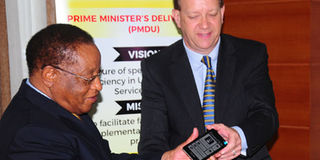Ugandan government to pay civil servants per day

Technology. The head of the Prime Minister’s Implementation Unit, Prof Ezra Suruma receives the biometric machines from Mr Adrian Green, the head of growth and economic management at DFID in Kampala on Tuesday. PHOTO | MCL
What you need to know:
Prof Ezra Suruma, the head of the Delivery Unit in the Office of the Prime Minister (OPM), said they are for a start installing biometric gadgets at public health and educational institutions to monitor clock-in, clock-out of health workers and teachers at their duty stations.
Kampala. The government is to start paying civil servants according to the number of days worked rather than a guaranteed monthly salary, a senior official said yesterday.
Prof Ezra Suruma, the head of the Delivery Unit in the Office of the Prime Minister (OPM), said they are for a start installing biometric gadgets at public health and educational institutions to monitor clock-in, clock-out of health workers and teachers at their duty stations.
Prof Suruma said salaries of absentee civil servants will be deducted equivalent to work days missed, he said.
“Last week, we were in Jinja for a meeting with district local governments and we were told that some districts no longer pay civil servants who absent themselves from work. We want other districts to follow suit because this is kisanja hakuna mchezo (no playing games),” he said yesterday.
Kaliro, Kayunga, Buvuma, Bulambuli, Bugiri and Bududa districts-- all in eastern Uganda-- are already implementing the scheme.
Prof Suruma, the former Finance minister and current Makerere University chancellor, made the comments while receiving an assortment of biometric machines donated by the British government through its overseas development arm, the Department for International Development (DFID).
The gadgets will be installed at public facilities in 22 districts in eastern Uganda piloting the scheme and the supervisors will be required to file daily reports of their supervisees’ attendance to OPM.
Bureaucrats say the previous practice of registering staff presence at work manually was ineffective and susceptible to errors.
Prof Suruma said citizens dissatisfied with delivery of government services had started reporting absentee employees directly to authorities using social media platforms, particularly WhatsApp.
“This has increased the level of community engagement in ensuring service delivery,” Prof Suruma said.
Mr Adrian Green, the head of Growth and Economic Management at DFID, said the equipment they donated also included laptops, printers, computers and their accessories.
They will be deployed for gathering, processing and analysing biometric information on teachers and health workers to improve the quality of service delivery at schools and hospitals.
“This is a grant worth half a million British pounds for a partnership we have been implementing with government for essential service delivery since 2015 where we have registered tremendous results,” Mr Green said.
About biometric tool. A biometric time and attendance system is a time clock that tracks some unique physical characteristic of each employee when they clock in or out. Biometric data comes in many forms, such as vascular patterns, fingerprints, iris patterns and voice recognition. Biometrics cannot be forged.




